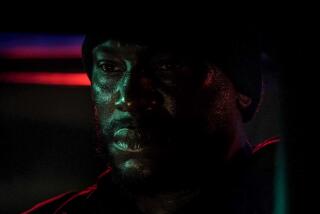Prejudice, and the damage done
- Share via
In nighttime New York City, a car thief suspect tries to talk his way out of arrest. He at first makes a motor-mouthed bid for empathy from the officer who’s apprehended him. When that doesn’t work, he switches to bribes. Then, in an explosion of frustration, the man, who is white, begins to hurl racial taunts at the black arresting officer. The officer’s gun goes off.
What then unfolds in the late Dennis McIntyre’s drama “Split Second” is a moral dilemma clouded by centuries of simmering anger. First presented in 1984, the play is revisited in a straight-ahead Los Angeles Theater Project presentation at Casa 0101 in Boyle Heights.
The staging is spare, with a New York skyline painted on the stage walls and scene furnishings revealed, as needed, from beneath dropcloths. The portrayals are so lived-in, though, that nothing else much matters. The moment Anthony Nelson, as the car thief suspect, races onstage, wild-eyed and breathless, the audience is yanked onto the deserted street where he says one thing too many.
Impassive during the initial inquiry into his actions, Rick Jarrett as the officer gradually lets his defenses crumble to reveal the worry and guilt inside. Calysta Ruth Watson portrays his strong, insistent wife, who urges him to put family and community above other concerns. And Darius L. Dudley as the officer’s retired policeman father is even-tempered yet unmovable as a man who fought discrimination to earn his badge and is pained by the thought that his son might tarnish his.
Best known for the art world play “Modigliani,” McIntyre in “Split Second” raises hard-to-answer questions about how long any population can be expected to live with negative assumptions, blithe discrimination and outright provocation before its anger spills over. Director Edward Padilla and a committed cast make sure we take those questions home to think over.
“Split Second,” Casa 0101, 2009 E. 1st St., Los Angeles. 8 p.m. Fridays and Saturdays, 3 p.m. Sundays. Ends May 21. $15. (323) 263-7684 or www.latheaterproject.org. Running time: 1 hour, 55 minutes.
More to Read
The biggest entertainment stories
Get our big stories about Hollywood, film, television, music, arts, culture and more right in your inbox as soon as they publish.
You may occasionally receive promotional content from the Los Angeles Times.











